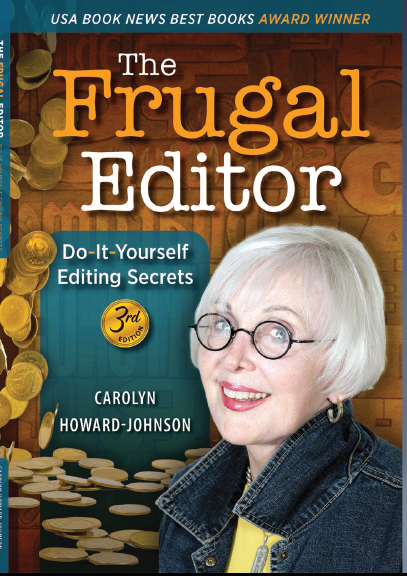Let Tom Swift Inform Your Writing
By Carolyn Howard-Johnson
The last in a series of articles celebrating the release of the 3rd edition
of the multi award-winning The Frugal Editor
Ever heard of Tom Swifties?
Maybe you're too young to be familiar with the classic Tom Swift adventures for boys. Or maybe you're a girl who never read a Tom Swift book nor cares to.
Tom Swifties are one-line jokes lampooning the style of Victor Appleton, the author of the original Tom Swift books. People started making jokes about his overuse of adverbs and the unnecessary taglines he wrote into his dialogue. Like the Polish jokes, they were so much fun that that a whole series of them became available for pun aficionados (though they deservedly disappeared—mostly—as people started avoiding anything that smacked of cultural bias.) The author of Appleton’s classics, of course, laughed all the way to the bank and I was never able to determine if he overused them intentionally or if his popularity survived at least in part because they seemed unintentional and that only lent another dimension to their laughability. But that's a lesson for one of my marketing seminars, not this article on writing.
Tom Swifties were popular and funny back then. This is now. I haven't dared to go to the new books in the series, but I assume that this outdated writing has been eliminated from them.
An example from one of the Swift books will suffice to let you know what to watch for. (Thank you to Roy Peter Clark for this example.)
"'Look!' suddenly exclaimed Ned. 'There's the agent now!…I'm going to speak to him!'” impulsively declared Ned.'"
Regardless of what you think of Appleton’s style choices, you will want to minimize tags when you write dialogue and adverbs in most everything you write!
Even authors who swear that adverbs are always very, very good things to use and are reluctant to give up their clever taglines can see how, well, …awful this is. In fact, I have to reassure clients and students the quotation is real! Some of the writing that comes to the desks of agents and editors looks almost as bad. Here's how you can make sure yours doesn't:
1. Use taglines only when one is necessary for the reader to know who is speaking. Learn new dialogue techniques to make that job easier from books like Writing Dialogue by Tom Chiarella and the third edition (only recently released) of my The Frugal Editor.
2. Almost always choose "he said" or "she said" over anything too cute, exuberant, or wordy like "declared" and "exclaimed."
3. Cut the "ly" words ruthlessly, not only in dialogue tags but everywhere.
4. Learn how to make this adverb-cutting exercise improve the images in your prose or poetry using simile or metaphor, also covered in The Frugal Editor.
Until you do a little more research on the adverbs, take Nike's advice and "Just do it!"
---
Carolyn Howard-Johnson, multi award-winning author of The Frugal Book Promoter: How to Do What Your Publisher Won't and The Frugal Editor: Do It Yourself Editing Secrets, both now in their third editions from Modern History Press. The former is the winner of USA Book News "Best Professional Book" award and the Book Publicists of Southern California's coveted Irwin Award. The Frugal Editor is both a USA Book News winner and a Reader Views Literary Award winner and won the Next Generation Marketing and the coveted Irwin awards. Learn more at www.HowToDoItFrugally.com. Thank you, #WritersontheMove, for the opportunity to wind down my marketing plan for the release of new edition of Frugal Editor with this article! Gotta make room for a couple of new books in that series coming in 2024!






